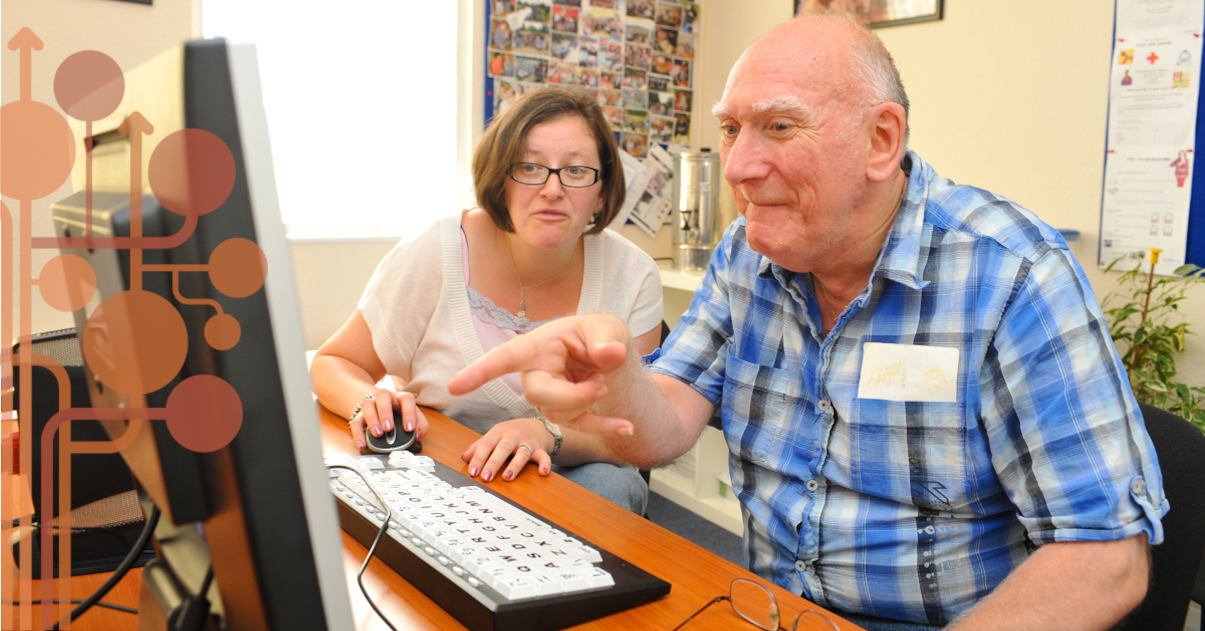Seniors in a digital world. One-to-one consultation, training courses or self-learning?
5 min read- like, share, comment!
First published in Polish by Nina Woderska
Most teachers waste time by asking questions, which are intended to discover what a pupil doesn't know, whereas the true art of questioning has for its purpose to discover what the pupil does know or is capable of knowing.
(Albert Einstein)
I remember Wacław, who came to see me with a laptop 'inherited' from his grandchildren. I introduced myself and asked if he had used it and had ever surfed the Internet. He nodded affirmatively. – Yes, I did it with my grandchildren, he added. – Good, I said and smiled. – Can you please turn it on for me? Today, we will investigate virtual reality together.
When Wacław took the computer out of the bag and put it the other way round, i.e. with the monitor down and the hinges facing us, I knew that the journey would have to start from the very beginning and would include showing him how to open the laptop and which button to press to turn it on. Of course, at that time, Wacław had to take each of these steps on his own, with a little help from me.

Wikimedia Commons
I also remember that he was a brilliant student. After several one-to-one meetings, he could use a voice search to buy seedlings for his garden in an online store. During these few meetings lasting one hour each, he also told me many stories, which I will not share with you but will certainly remember for a long time.
I also remember a gentleman who asked me to help him brush up on his word-processing skills so that he could digitise his poems to make them ready for publication. I remember a lady who wanted to learn how to create an account on one of the social networks. With much embarrassment, she finally revealed that she needed this skill because she hoped to get in touch with her old beau.
Digital exclusion of seniors and face-to-face consultation
It is no secret that I strongly advocate one-to-one consultations as a strategy of choice in digital education for senior citizens. From my experience of several years, I can tell that a personalised approach makes a huge difference in the successful digital inclusion of the elderly.
During the consultations, seniors:
- ask a lot of questions -- they are not afraid to ask them, although still with some embarrassment;
- are able to get to know their equipment better - they usually work on their own devices - a laptop or smartphone;
- become capable of adapting their equipment to their preferences, capabilities and needs, and as a result (so I suspect), they reach for it more often, make further attempts to get to know it and become convinced of the advantages of the digital world.
During one-to-one consultation sessions, it is easier to:
- adapt the level and range of knowledge imparted by the tutor so that the senior learner can both learn what he or she needs most and has more time to practise using the device themselves (e.g. a mouse or keyboard);
- relate to the learner's personal experiences;
- slow down or speed up the pace of learning when appropriate.
However, by listing the advantages of one-to-one instruction, it is not my intention to question the value of group training or workshops. Group learning also offers great potential for promoting the digital literacy of senior citizens. Such training is often subsidised and organised in institutions and municipal or communal centres, making them accessible for the residents of large and small towns. Obviously, as in the case of consultations, many major factors impact the assumed objectives and training outcomes. They include the training venue, knowledge and skills of the tutor and the group, the atmosphere during classes, and available equipment (including elements that facilitate using computers, such as keyboards for seniors or colour contrast overlays on websites), and many others.
Monika Schmeichel-Zarzeczna has authored several brilliant articles about the challenges and opportunities of digital literacy courses that feature on EPALE. As an example, I can quote Seniorzy w sieci wspomnień – kursy komputerowe i inne biblioteczne działania wprowadzające seniorów w cyfrowy świat. This is an article available in Polish and French, and I strongly recommend reading it. Spoiler alert: you can find valuable advice on engaging and encouraging seniors to use new technologies once a training course is over. Digital Storytelling, which Monika discusses in the article, is a clever idea for activities addressed to seniors at risk of digital exclusion.
I know I know nothing or learning on your own
Referring to the Einstein's quote above, I believe it is not only information about what students already know that matters. Of course, this knowledge allows an instructor to build on the existing knowledge and expand it. Knowing what the learners want to learn and their needs are also important. It's not a revelation, but I think it's one of the important steps in learning about new technologies - especially for seniors. Before taking part in a course or consultation, seniors can get to know (at first purely theoretically) the areas or possibilities offered by the Internet.
What is my advice for my students? Update and gain knowledge on your own as well. There are many valuable websites, applications, videos and tutorials - for example, and you can already see over a dozen episodes of the "Zapytaj Magdę" series on the Pokolenia online TV channel. In the series, its host, Magda Foryś, introduces seniors to the secrets of the digital world.
My first piece of advice, however, is to read books and other publications. There is always a risk that the knowledge presented in such publications quickly becomes outdated, but they can certainly guide seniors on the possibilities offered by computers and the Internet. If you know Polish, you can use a few suggestions listed below. Their authors offer these materials free of charge.
-
"Podręcznik obsługi Komputera i Internetu" "If you are a senior citizen and would like to explore on your own, download the free Computer and Internet Manual. If you are a digital skills trainer and teach classes to seniors on a non-commercial basis, download the manual and share your knowledge!" - this is how the authors from the AgeHUB Foundation encourage the readers to use the publication.
- "Nowoczesny senior. Przewodnik dla Seniorek i Seniorów po cyfrowym świecie" - Modern Seniors’ Guide to digital world is another great publication. The Digital Poland Foundation prepared it, and it can be downloaded free of charge from the website: www.digitalpoland.org.
- "Warszawski Elementarz Cyfrowy" - Rudiments of Digital Literacy is a textbook adapted to the learning needs of older people prepared by the City of Warsaw and HELION S.A. publishing house.
Knowledge of new technologies can also be acquired and consolidated at home using books and publications available in libraries. Information on their availability and location can be found in online catalogues. It's never too late to learn something new!
dr Nina Woderska – pedagogue by education, lecturer in postgraduate studies in psychogerontology at the University of Wrocław and the University of Health Sciences, an employee of the Centre for Senior Initiatives in Poznań and a coach at the CREO Association. She is an EPALE Ambassador.
Further reading:
How to establish relationships online?
(In)visible hand - support for seniors citizens during a quarantine





Comments
Teaching to use comouter to seniors
For more advanced users, I think it is very important to teach to read notifications and to use google to find insteuctions on "how to".
For less advanced users, the type and usability of tje device matters a lot. I found much easier to use Ipad to inexperienced senior than normal laptop, especially if to make all elements larger.
Edukacja dot. kompetencji cyfrowych wciąż potrzebna
Edukacja dot. kompetencji cyfrowych, pomimo wielu programów i projektów jest wciąż ogromnie potrzebna. Realizując zajęcia z dorosłymi na wsiach wciąż spotykam wiele osób 50+, które są wykluczone w tym zakresie. Ci aktywni, sami szukają sposobów i miejsc, gdzie mogą zdobywać nową wiedzę ale jest też szeroka rzesza osób, które niestety z edukacji dot. kompetencji cyfrowych nie korzystają i mają z nimi ogromny problem. Mam wrażenie, że pandemia jeszcze ten problem pogłębiła.